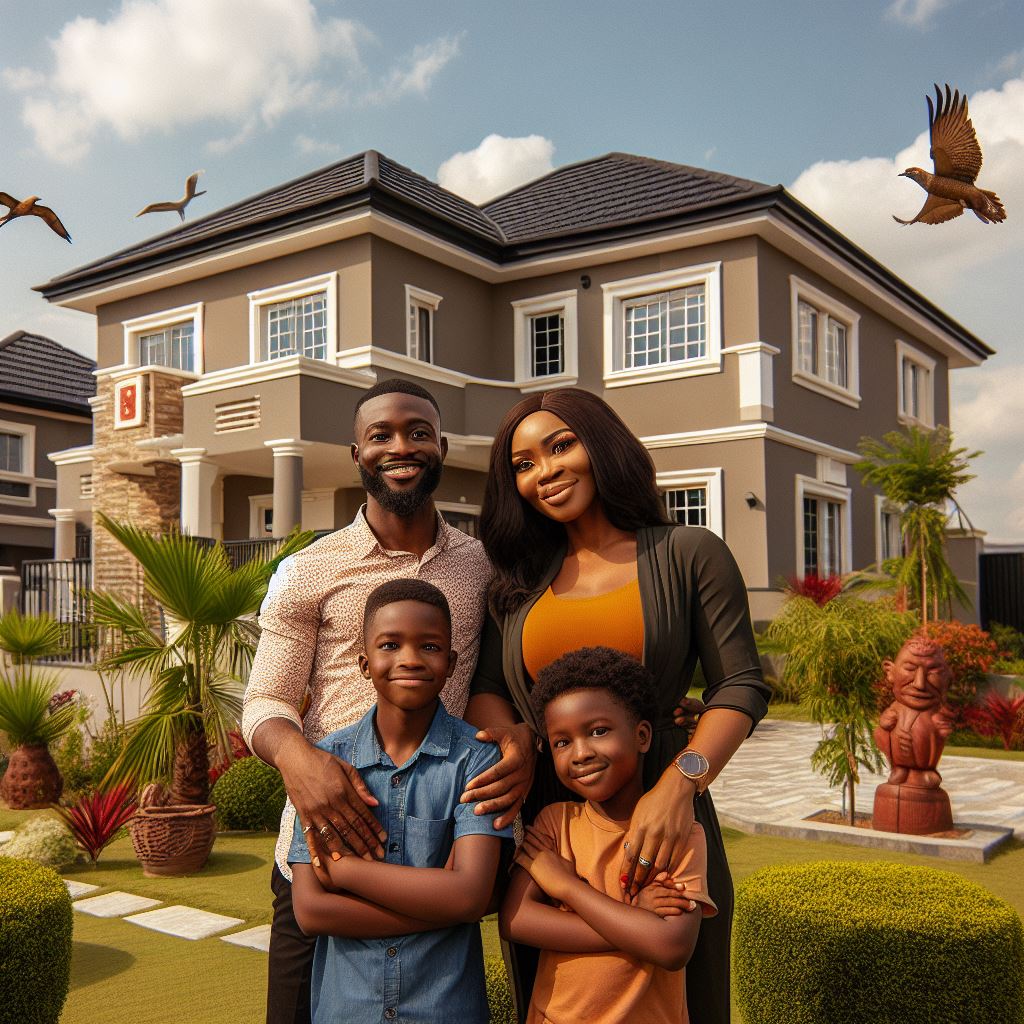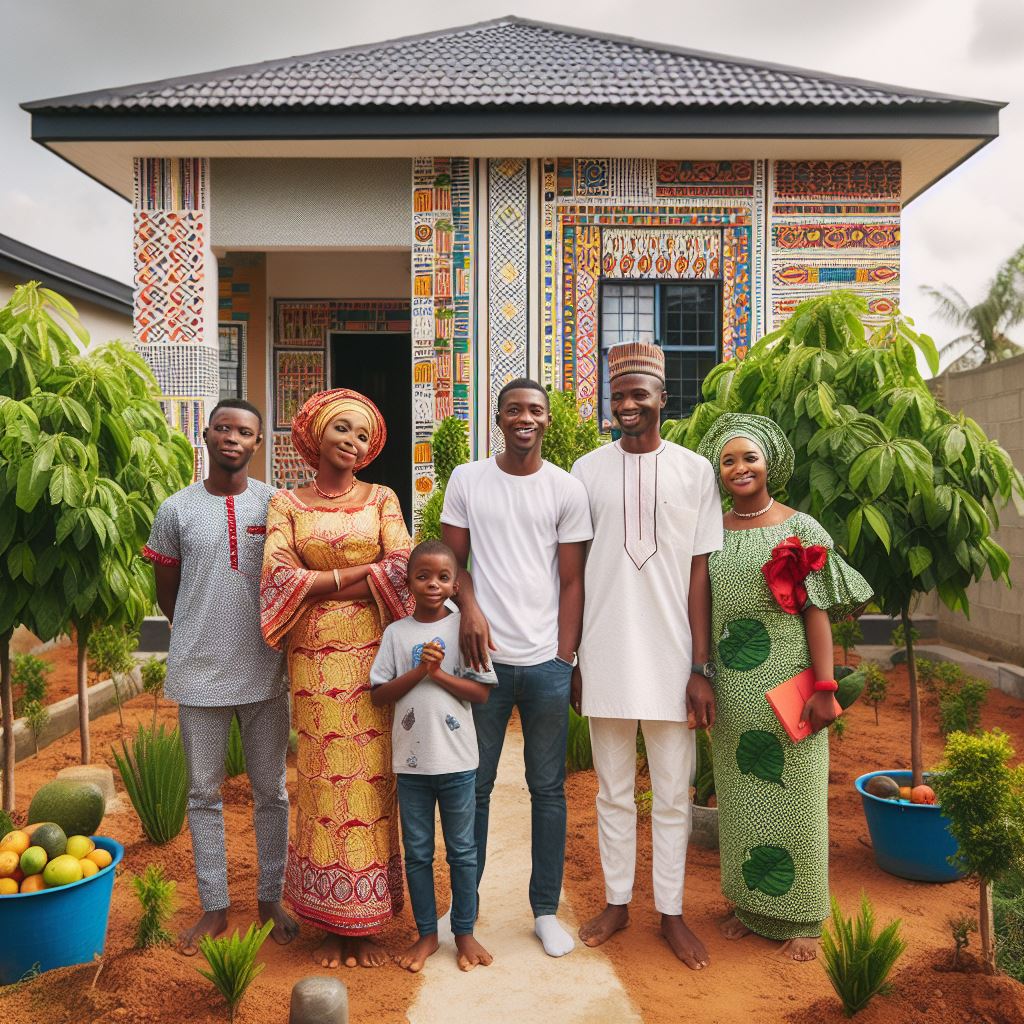Introduction
In the hustle and bustle of modern life, the importance of saving money cannot be overstated.
Whether you’re a savvy entrepreneur or a diligent employee, having a financial safety net is crucial.
This blog post aims to shed light on a particularly pertinent debate for Nigerians: the choice between renting and owning a home.
Saving money is a cornerstone of financial stability.
It provides a safety net for emergencies, a foundation for future investments, and a sense of security in an ever-changing economy.
Nigerians, like everyone else, face the challenge of balancing the need for immediate gratification with the necessity of long-term financial planning.
With the right strategies, saving money can become a habit that opens doors to opportunities and safeguards against unexpected setbacks.
The decision to rent or own a home is a pivotal moment in anyone’s financial journey.
Both options come with their own set of advantages and considerations.
Renting offers flexibility, freedom from property maintenance responsibilities, and the ability to easily relocate.
On the other hand, owning a home provides a sense of stability, potential appreciation in property value, and the opportunity to build equity.
For Nigerians, the choice may be influenced by cultural factors, economic conditions, and personal preferences.
Exploring the pros and cons of each option is essential.
Renting might be a wise choice for those who value flexibility or are uncertain about their long-term plans.
Meanwhile, owning a home could be a strategic move for those seeking a long-term investment and a place to call their own.
Your Personalized Financial Plan
Get expert financial advice tailored exclusively to your goals. Receive a custom roadmap in just 1-3 business days.
Get StartedIn the sections that follow, we’ll delve deeper into the intricacies of renting and owning a home in Nigeria.
From financial considerations to cultural nuances, our goal is to empower readers to make informed decisions that align with their unique circumstances and aspirations.
Stay tuned for valuable insights and practical tips on navigating the intricate path of financial decision-making in the context of Nigerian realities.
Considerations before deciding to rent or own
When it comes to the decision of whether to rent or own a property in Nigeria, there are several key considerations to keep in mind.
These factors can greatly impact financial stability, location preferences, and overall lifestyle choices.
By carefully evaluating these aspects, individuals can make informed decisions that align with their goals and priorities.
Financial stability
One of the primary considerations before deciding to rent or own is financial stability.
This involves assessing personal income and expenses.
Individuals should have a clear understanding of their monthly income and fixed expenses, such as bills, loans, and other financial obligations.
By having a solid grasp of their financial situation, individuals can determine whether they can afford the costs associated with owning a property, such as mortgage payments, maintenance, and insurance.
Saving for emergencies is another important aspect of financial stability.
Before considering homeownership, individuals should build an emergency fund.
This fund serves as a safety net to cover unexpected expenses related to owning a property, such as repairs or unexpected job losses.
Having this financial cushion in place provides peace of mind and helps protect against potential financial hardships.
Unlock a Debt-Free Future with Our Unique Strategies
Imagine a life unburdened by debt—a reality we help you visualize and achieve. We offer personalized strategies tailored to your unique situation, guiding you step-by-step toward financial freedom.
Start TodayLocation preferences
Location preferences also play a significant role in the rent or own decision-making process.
Individuals must consider whether they prefer urban or rural areas.
Urban areas often provide convenient access to job opportunities, schools, and amenities, but they can be more expensive.
In contrast, rural areas may offer a more affordable cost of living, but individuals may have to sacrifice proximity to certain facilities and conveniences.
Furthermore, proximity to work, schools, and amenities is a crucial factor to consider.
Renting or owning a property close to one’s workplace can save time and transportation costs.
Similarly, living near good schools can be essential for families with children.
Access to amenities such as parks, shopping centers, and healthcare facilities can greatly impact the overall convenience and quality of life.
Lifestyle factors
Lifestyle factors should also be taken into account.
Mobility and flexibility are important considerations.
Renting allows individuals to easily relocate or adapt to changing circumstances.
On the other hand, owning a property binds one to a specific location and requires a long-term commitment.
Individuals with uncertain plans or frequent job mobility may find renting more suitable for their needs.
Long-term plans and goals are equally important when deciding to rent or own.
Unlock Untapped Nigerian Wealth with Our Expert Advice
Imagine accessing investment opportunities others overlook—stocks, bonds, real estate, small businesses tailored to you. We offer personalized advice you won't find elsewhere, guiding you to financial success.
Unlock WealthOwning a property can provide stability and serve as an investment for the future.
It allows individuals to build equity and potentially generate additional income through rental properties.
However, if long-term plans include job changes, travel, or living abroad, renting may be a more suitable option.
In fact, before making the decision to rent or own a property in Nigeria, it is crucial to carefully consider various factors.
Financial stability, location preferences, and lifestyle factors all play significant roles in determining the best choice.
By assessing personal income and expenses, saving for emergencies, evaluating location preferences, and considering long-term plans, individuals can make informed decisions that align with their goals and ensure a secure and comfortable living situation.
Read: Financial Sense: Renting or Owning in Nigeria?
Advantages of renting
Renting a home can offer several advantages compared to owning a property in Nigeria.
It provides financial flexibility and freedom that may align better with individual circumstances and goals.
This section will explore some of the main benefits of renting.
Lower upfront costs
One of the immediate advantages of renting is the lower upfront costs involved.
Unlike owning a home, there is no need to make a substantial down payment or cover mortgage expenses.
This significantly reduces the financial burden when it comes to acquiring a place to live.
Renting also allows individuals to avoid maintenance and repair costs.
As a tenant, you are not responsible for major repairs or upgrades to the property.
Any necessary repairs will usually be the responsibility of the landlord, saving you both time and money.
Flexibility and mobility
Another advantage of renting is the flexibility it offers.
Renting provides the freedom to easily relocate based on personal or professional needs.
If you have a job that requires you to frequently move or if you simply enjoy exploring different neighborhoods, renting allows you to do so without the commitment of owning a property.
Furthermore, renting often grants access to better amenities and facilities.
Many rental properties offer shared amenities such as gyms, swimming pools, and play areas, which may not be affordable or practical to have in an owned property.
This allows tenants to enjoy a higher quality of life without the added expenses.
In short, renting provides several advantages, especially for those who prioritize financial flexibility and mobility.
Lower upfront costs and the ability to avoid maintenance and repair expenses make renting an attractive option.
Additionally, the freedom to easily relocate and access better amenities adds to the overall appeal of renting.
Ultimately, the decision to rent or own a property depends on individual preferences and circumstances, and it’s crucial to carefully consider these advantages before making a choice.
Read: Nigerian Housing: Rent or Buy for Savings?
Advantages of owning
Owning a home offers a multitude of advantages, making it a financially wise decision for many individuals.
Building equity
One of the primary benefits of owning a home is building equity, which serves as a long-term investment opportunity.
As the property appreciates, the homeowner’s equity grows, allowing them to reap the financial benefits in the future.
The potential for property value appreciation is another advantage of owning.
In a thriving real estate market, property values tend to increase steadily over time.
This appreciation can result in substantial returns on investment if the homeowner decides to sell the property later on.
Stability and control
Stability and control are also significant advantages of homeownership.
Unlike renting, owning a home provides the freedom to personalize and modify the property to suit one’s preferences.
Whether it’s painting the walls, renovating the kitchen, or landscaping the backyard, homeowners have the autonomy to make changes as they please, creating a space that truly feels like home.
Additionally, homeowners are protected against rent increases that often plague renters.
Rental prices often rise with inflation, leaving renters vulnerable to financial stress.
By owning a home, individuals can avoid this uncertainty and have peace of mind knowing their housing costs will remain more stable in the long run.
Tax benefits
Homeownership also comes with tax benefits.
Homeowners can deduct mortgage interest and property taxes from their taxable income, reducing their overall tax liability.
This can result in significant savings during tax season and provide additional financial flexibility.
In essence, owning a home offers numerous advantages, including building equity, potential for property value appreciation, stability and control, and tax benefits.
By weighing these advantages against the costs associated with homeownership, individuals can make an informed decision on whether renting or owning is the right choice for them.
Ultimately, owning a home can be a smart long-term investment, providing both financial stability and a place to call your own.
Read: Budget Dining: When It Beats Cooking

Financial considerations when renting
When it comes to renting a property, there are several important financial considerations that every Nigerian should keep in mind.
Understanding these considerations will help individuals make informed decisions and effectively manage their finances.
This section will explore the financial aspects of renting, including evaluating rental costs and budgeting for other financial goals.
Evaluating rental costs
One of the first steps in renting a property is evaluating the associated costs.
This includes considering both the monthly rent and utility expenses.
When creating a budget, it is crucial to ensure that the rental costs are affordable and sustainable in the long run.
The goal is to find a balance between comfort and financial stability.
In addition to the monthly rent, individuals must take into account other expenses such as security deposits and maintenance fees.
Security deposits are typically required by landlords as a form of insurance against damages to the property.
It is important to understand the terms and conditions regarding the refund of the deposit to avoid any surprises at the end of the lease.
Maintenance fees are another factor to consider.
Some rental properties may require tenants to contribute towards the maintenance of common areas or to cover the costs of repairs.
These fees can vary, so it’s important to factor them into the overall budget.
Budgeting for other financial goals
While renting a property, it is essential to think about other financial goals and how they fit into the overall budget.
Two important goals to consider are education and retirement savings.
Saving for education is a top priority for many Nigerians.
Renting a property should not hinder this goal.
By properly budgeting for rent and other necessary expenses, individuals can still set aside funds for their education needs or those of their children.
Retirement savings should also be a part of the financial plan.
Renting a property should not prevent individuals from saving for a comfortable retirement.
By assessing the rental costs and finding ways to balance them with other necessary expenses, Nigerians can still contribute to their retirement savings accounts.
To maintain financial stability while renting, it is crucial to strike a balance between rent and other necessary expenses.
Consider cutting down on discretionary spends and prioritize needs over wants.
It may be necessary to make adjustments in other areas of the budget to ensure that rent does not become a burden.
In a nutshell, financial considerations play a significant role when deciding whether to rent a property.
Evaluating rental costs, including monthly rent, utilities, security deposits, and maintenance fees, is essential.
Additionally, budgeting for other financial goals, such as education and retirement, is crucial to maintaining financial stability while renting.
By carefully assessing these considerations, Nigerians can make informed decisions and effectively manage their savings.
Read: Cooking or Dining Out: What’s Cheaper?
Learn More: Setting Boundaries: No to Friends’ Financial Asks
Financial considerations when owning
When it comes to deciding whether to rent or own a home in Nigeria, there are several financial considerations to take into account.
Owning a home is a significant financial commitment, and it is important to assess affordability before making a decision.
Affordability assessment
One of the first steps in the affordability assessment is calculating the total cost of ownership.
This includes not only the purchase price of the property but also other expenses such as maintenance costs, utilities, and homeowners association fees.
It is essential to have a clear understanding of these costs to determine if homeownership is financially feasible.
Another key aspect of affordability is budgeting for mortgage payments, insurance, and property taxes.
These ongoing expenses can add up significantly and should be included in the monthly budget.
It is crucial to ensure that these payments can be comfortably made without putting excessive strain on one’s finances.
Financing options and available schemes
When it comes to financing options, there are various mortgage plans and interest rates to consider.
It is essential to research and compare different lenders to find the most favorable terms.
Interest rates can significantly impact the overall cost of homeownership, so it is crucial to secure the best rate possible.
Additionally, there are government schemes available for first-time homebuyers in Nigeria.
These schemes often offer favorable terms and incentives to encourage homeownership.
It is worth exploring these options to determine if they align with one’s financial goals and circumstances.
Basically, financial considerations play a crucial role in the decision to rent or own a home in Nigeria.
Conducting an affordability assessment, which includes calculating the total cost of ownership and budgeting for ongoing expenses, is essential.
It is equally important to explore different financing options, such as mortgage plans and government schemes for first-time homebuyers, to make an informed decision.
By taking these factors into account, individuals can make a sound financial choice that aligns with their long-term goals and financial stability.
Case study: Renting vs Owning in Nigeria
Analysis of rental market in major cities
When considering whether to rent or own a property in Nigeria, it is essential to analyze the rental market in major cities.
Understanding the costs and market trends can help individuals make informed decisions about their housing options.
- Cost comparison between apartments and houses: One of the key factors to consider is the cost of renting apartments versus houses. Apartments generally have lower rental prices compared to houses, making them more affordable for many individuals.
- Rental market trends and forecasts: Additionally, it is crucial to study the rental market trends and make forecasts. This analysis provides insights into the future direction of rental prices, allowing potential renters and property owners to plan their finances accordingly.
Examination of various property ownership options
Aside from renting, individuals in Nigeria also have various property ownership options available to them.
Understanding these options can help individuals determine the most suitable route to achieving their housing goals.
- Affordable housing programs: Nigerian government and private organizations offer affordable housing programs specifically designed to support individuals with limited financial means. These programs provide opportunities for property ownership even for those with lower incomes.
- Real estate investment opportunities: For individuals seeking long-term financial growth and stability, investing in real estate can be a viable option. Real estate investment offers potential returns and allows individuals to acquire valuable assets that appreciate over time.
By exploring the available affordable housing programs and real estate investment opportunities, individuals can evaluate which option aligns best with their financial goals and aspirations.
All in all, comparing the cost of renting apartments and houses, analyzing rental market trends, and exploring property ownership options are essential steps to consider when deciding between renting or owning property in Nigeria.
Making informed choices can significantly impact an individual’s savings and financial well-being in the long run.
Conclusion
In navigating the age-old dilemma of renting versus owning a home in Nigeria, it’s crucial to recognize the various factors that impact this decision.
We’ve delved into the financial implications, cultural considerations, and the dynamic nature of the real estate market.
A key takeaway is that both options have their merits, and the optimal choice depends on individual circumstances.
Firstly, we explored the financial aspects, highlighting that while renting may offer more immediate flexibility, owning a home can be a long-term investment.
Factors such as market trends, interest rates, and personal financial stability play pivotal roles in making this decision.
Culturally, the concept of homeownership holds significant value in Nigeria.
However, shifting societal norms and a growing urban population are challenging this tradition.
It’s essential to balance cultural expectations with individual aspirations and financial capabilities.
Furthermore, the dynamic nature of the real estate market in Nigeria demands careful consideration.
Property values fluctuate, and unforeseen economic factors can impact the decision to buy or rent.
Staying informed about market trends and seeking professional advice is imperative for making a sound decision.
Recognizing personal circumstances and preferences is crucial in making this decision.
Assess your financial health, short-term goals, and long-term aspirations.
Consider factors like job stability, family size, and lifestyle preferences. Your decision should align with your values and contribute to your overall well-being.
In the end, the journey towards deciding to rent or own a home in Nigeria is deeply personal.
It’s not just about investing in property; it’s about investing in your future.
By aligning your decision with your financial goals and lifestyle, you can create a harmonious living situation that complements your aspirations.
Remember, the key is making an informed decision.
Research the market, understand your financial capacity, and project how your choice aligns with your long-term goals.
Whether you choose to rent or own, let it be a decision rooted in knowledge and tailored to your unique circumstances.
The path to financial security and a comfortable living situation in Nigeria begins with a thoughtful choice between renting and owning a home.




